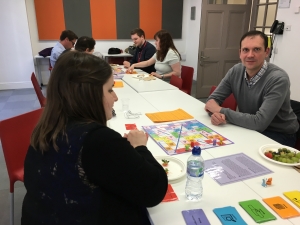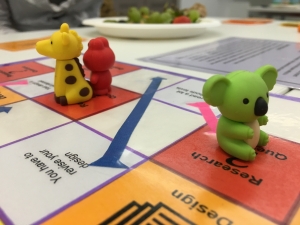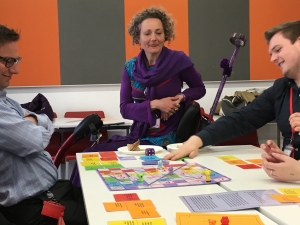In January, Dr Kay Inckle was awarded an LTI Grant for her “Game of Research” project. She received funding and help from staff at LTI to design and create a board game to help social science students understand the “essential components for a successful qualitative research project”. Findings from her evaluation of the first stage of this project give us some interesting pointers as to how games can be used to support teaching and learning.
The game
The main aspects of the game are:
- it functions like Snakes and Ladders in that players will roll a dice and count squares along the board. However, as Kay points out, “in the research version the ‘snakes’ will begin on squares which contain a research-related set-back […] The ‘ladders’ will also stem from a square on the board, but this time it will have a positive research-related activity, […] and the student moves ahead accordingly.”
- as players move through the board, they collect what Kay calls “research-essentials” cards (six categories representing the main steps when conducting a qualitative research project) by landing on a designated square and then selecting from a range of cards in the category.
- in order to win, a student must be the first person to reach the final square of the board with a full set of six correct research cards.



Findings and feedback
The game was piloted with groups of students, academics and LTI staff. It was also presented at LTI’s Learning Technology Ideas Exchange and attracted interest among academics who attended.
As Kay put it in her report, feedback from both students and staff highlighted the fact that “the game proved to be an enjoyable and effective means of learning about how to conduct a qualitative undergraduate research project”.
Enjoyable:
Many students identified the activity as being a “fun” way of learning about the key elements in qualtitative research. This was seconded in the feedback from staff: “I think it is a very nice way of presenting a potentially ‘boring’ topic”
Effective:
The format chosen made it easier to identify and remember the key aspects of a successful research project. The various steps were made clear thanks to the category cards, and the fact that students needed to select a card rather than randomly pick one ensured that “discernment and learning [were] integral to success in the game. ” Even though there is an element of luck, it is not enough to reach the end of the board first. Indeed, if a student reaches the end but some of their cards are incorrect, they return all of the cards to the pile and start again from the beginning. This again reinforces the idea that discernment is key to winning the game/successfully conducting a research project and gives many opportunities to students to familiarise themselves with research methodology.
“I thought it was fun and allowed me to remember what was right and wrong”
“it covers all the key elements in qualitative research and it’s very clear”
“it made the issues very explicit”
“it was fun and informative”
The game was also seen as a “creative” and “engaging” way of learning which triggered reflections and discussions among learners. As pointed out in the report, “it was also interesting to see how much the students began to discuss and problem-solve together as the game progressed”.
Next steps
- Following on the feedback gathered during the pilot phase, some adjustments will be made, particularly to address the issue that finishing and winning the game proved to be challenging and in some cases frustrating.
- The final version will then be retested, and its components will be made into downloadable files and available via Creative Commons
- Kay will apply for phase two of her project which consists in creating an online version of the game with the added benefits of allowing sharing and collaboration between users, as well as using students’ actual research projects.
Interested?
=> Get in touch with us if you would like to discuss using games and gamification in your teaching.
=> Have a look at our dedicated funding pages to discover about other (game) projects supported by LTI






